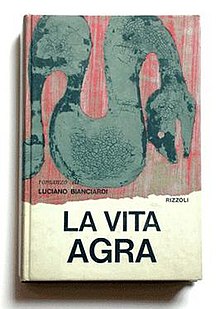
Grazia Maria Cosima Damiana Deledda was an Italian writer who received the Nobel Prize for Literature in 1926 "for her idealistically inspired writings which with plastic clarity picture the life on her native island [i.e. Sardinia] and with depth and sympathy deal with human problems in general". She was the first Italian woman to receive the prize, and only the second woman in general after Selma Lagerlöf was awarded hers in 1909.

Girolamo Tiraboschi S.J. was an Italian literary critic, the first historian of Italian literature.

Giuseppe Ungaretti was an Italian modernist poet, journalist, essayist, critic, academic, and recipient of the inaugural 1970 Neustadt International Prize for Literature. A leading representative of the experimental trend known as Ermetismo ("Hermeticism"), he was one of the most prominent contributors to 20th-century Italian literature. Influenced by symbolism, he was briefly aligned with futurism. Like many futurists, he took an irredentist position during World War I. Ungaretti debuted as a poet while fighting in the trenches, publishing one of his best-known pieces, L'allegria.
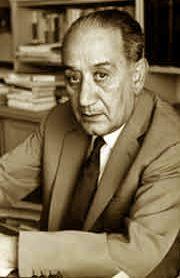
Secondino Tranquilli, best known by the pseudonym Ignazio Silone, was an Italian politician, novelist, essayist, playwright, and short-story writer, world-famous during World War II for his powerful anti-fascist novels. Considered among the most well-known and read Italian intellectuals in Europe and in the world, his most famous novel, Fontamara, became emblematic for its denunciation of the condition of poverty, injustice, and social oppression of the lower classes, has been translated into numerous languages. From 1946 to 1963, he was nominated for the Nobel Prize in Literature.
William Fense Weaver was an English language translator of modern Italian literature.

Sir Mario Praz was an Italian critic of art and literature, and a scholar of English literature. His best-known book, The Romantic Agony (1933), was a comprehensive survey of the decadent, erotic and morbid themes that characterised European authors of the late 18th and 19th centuries. The book was written and published first in Italian as La carne, la morte e il diavolo nella letteratura romantica in 1930; and the most recent edition was published in Florence by Sansoni in 1996.

Biagio Marin was a Venetian and Italian poet, best known for his poems in the Venetian language. In his writings he never obeyed rhetoric or poetics. He only employed a few hundred words for his poems.

Andrea De Carlo is an Italian novelist. He has published almost two dozen novels, many of which have been translated.
Giorgio Manganelli was an Italian journalist, avant-garde writer, translator and literary critic. A native of Milan, he was one of the leaders of the avant-garde literary movement in Italy in the 1960s, Gruppo 63. He was a baroque and expressionist writer. Manganelli translated Edgar Allan Poe's complete stories and authors like T. S. Eliot, Henry James, Eric Ambler, O. Henry, Ezra Pound, Robert Louis Stevenson, Byron's Manfred and others into Italian. He published an experimental work of fiction, Hilarotragoedia, in 1964, at the time he was a member of the avant-garde Gruppo 63. Centuria, which won the Viareggio Prize is probably his most approachable; it was translated into English in 2005 by Henry Martin. Agli dei ulteriori comprises a linked collection of short pieces including an exchange of letters between Hamlet and the Princess of Cleves and concludes with a fake learned article on the language of the dead. He died in Rome in 1990. He was an atheist. Italo Calvino called him 'a writer unlike any other, an inexhaustible and irresistible inventor in the game of language and ideas'.
Luciano Rebay, known especially for his work on the poets Giuseppe Ungaretti, and Eugenio Montale, was one of the leading post-war critics of Italian literature in America.

Gianni Celati was an Italian writer, translator, and literary critic.

Ribolla is a village in southern Tuscany, a frazione of the comune of Roccastrada, in the province of Grosseto. At the time of the 2001 census its population amounted to 2,115.
Hermeticism in poetry, or hermetic poetry, is a form of obscure and difficult poetry, as of the Symbolist school, wherein the language and imagery are subjective, and where the suggestive power of the sound of words is as important as their meaning. The name alludes to the mythical Hermes Trismegistus.
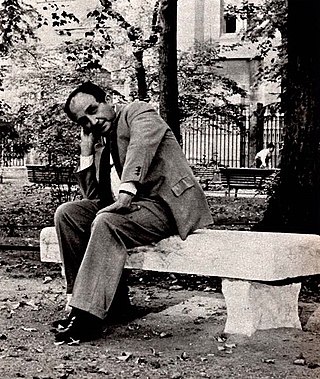
Alfonso Gatto was an Italian writer. Along with Giuseppe Ungaretti he is one of the foremost Italian poets of the 20th century and a major exponent of hermetic poetry.
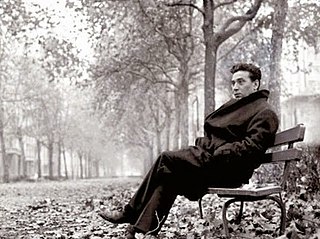
Luciano Bianciardi was an Italian writer, journalist, translator and librarian.

La vita agra is a 1964 Italian film by director Carlo Lizzani, based on Luciano Bianciardi's novel of the same name.
Eric Mosbacher was an English journalist and translator from Italian, French, German, and Spanish. He translated work by Ignazio Silone and Sigmund Freud.

Giorgio Orelli was an Italian-speaking Swiss poet, writer and translator.
Maria Messina was an Italian writer.
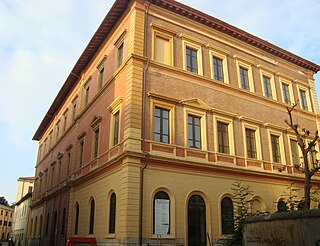
The Biblioteca Chelliana is a public library in Grosseto, Italy, founded in 1860 by Giovanni Chelli. In 1865, it became a public library as Biblioteca comunale Chelliana. It currently occupies the Palazzo Mensini built in 1898.
